[Shutter] Taquile Island
25 de Marzo 2015
Shutter Taquile Island"It's too touristy," they said "just do the day tour and don't even stay in Puno, get a night bus straight out, " claimed another backpacker."Lake Titikata [funny enough the name wasn't why we we wanted to swing through] is the largest, highest freshwater lake in the world. It shares a border with Bolivia and is full of inhabited islands. The most famous, Uros. 87 man-made islands, of what you ask? Reeds. A long time ago, poor fisherman decided to escape from normal society and build their own land with their own rules that removed the commute to work everyday. Yes, known as a very touristy place often referred to a reed-like Disneyland, but come on how could you not want to see this mini archipelago with your own eyes. Plus the lake has a few other islands where it's possible to stay overnight with a local family and learn about their culture. Sounds lovely to me.Nick [a Kiwi we me the night of his 30th bday], Ryan and myself said so long to our home for 17 days in Cusco and took off for Puno via a night bus. After a restless seven hour journey, we crawled off the bus before 6am. A short cab ride to the hostel where thankfully the lady owner let us check-in and climb back in bed. Later that day we explored Puno, and because we find it necessary to climb every high viewpoint in every city we visit, we tackled on 500 stairs to reach the condor statue [photo below]. 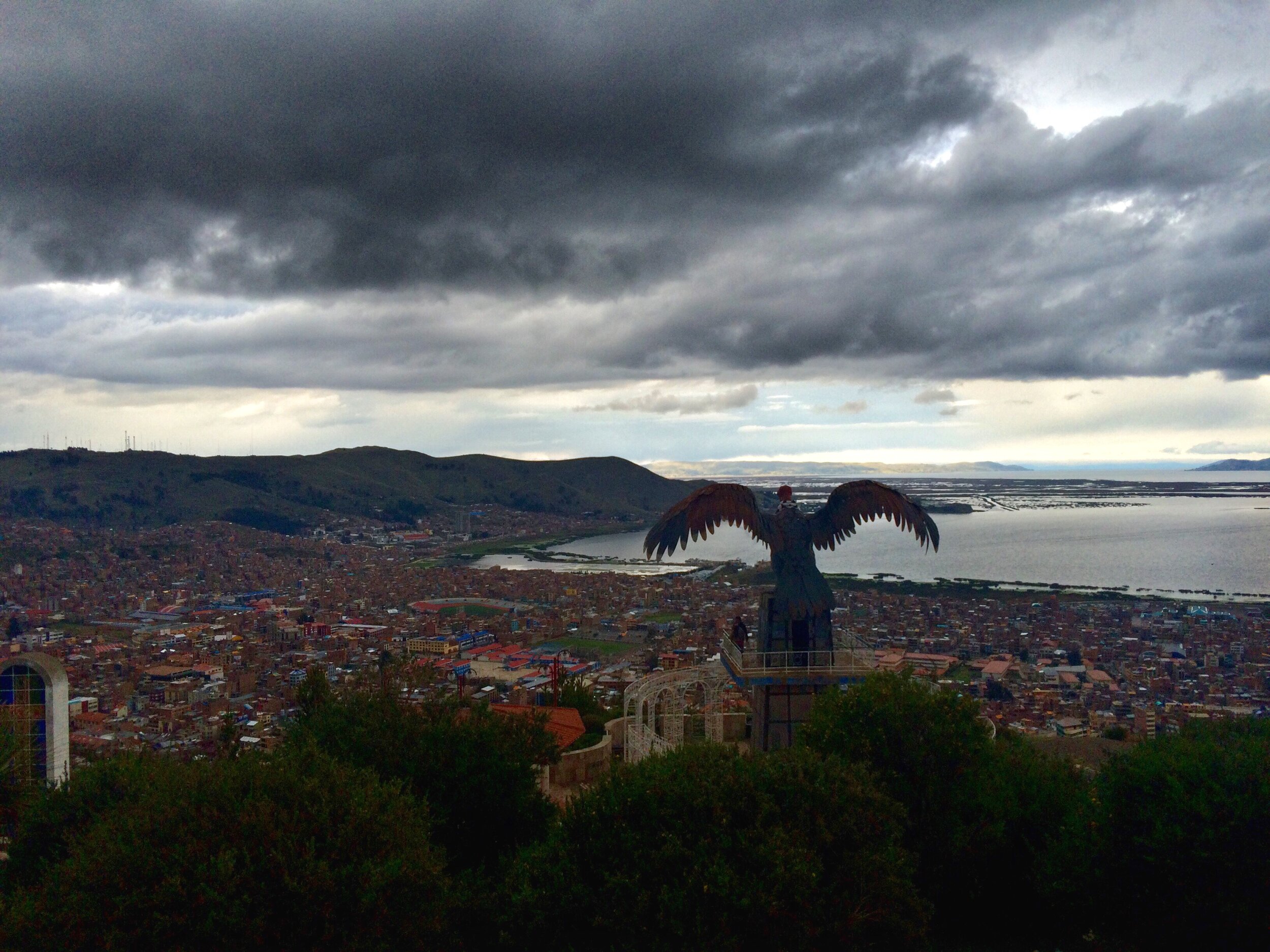 Una hermosa vista as the Latin Americans would say. Mountains protect the bustling city with a small port that sits on a calm blue lake stretching as far as the eye can see. In the distance you can barely see the difference between snow-capped mountain peaks and low hanging clouds. At 3800m the air is dry and warm when the sun shone and the temperature drops quickly as it disappears. We made plans with a tour company to set sail at 7:45am the next morning to head to the reed islands then onward to stay the night on Taquile Island.Doing it on our own rather than with an organized tour usually saves us a few dollars and doesn't force us in to following a guide all day. [usually an advantage] But upon boarding our boat we quickly gathered we'd be last to leave. Not a big deal. Until we departed. And our boat's speed was considerably slower than every other vessel on the water. After an hour and change we docked at one of the many reed islands in Uros. Whilst pulling up we saw women dressed in electric colored fabrics waving and begging for us to come to their island (and I wish we had). Our island included a very unenthusiastic host who whispered the process and design of creating his reed home without ever producing a smile. After a few mumbled sentences in Spanish, we were allowed to roam the tiny family island. It included a stove, a few houses and a table of sellable crafts. It was awkward walking on the reeds and it was awkward trying to avoid their obvious want for you to buy something. Then the man of the isla led us on to his boat he called Mercedes. This barco [made out of reed] had to be pushed by a tiny fishing boat with a motor and it brought us across the way to the "capital" which is complete with two restaurants, a lookout tower, a post office, and of course more handmade crafts for purchase. I spent my time chasing a black cat who had no intention of being caught. Ten minutes later we headed back to tour boat and as we were pulling away, I noticed we were missing the only other foreigner. When I looked back to the island, I saw her running in our direction and imagined her yelling "hello, what the fuck" in the french language. I started screaming at the crew, one finally heard me and turned the boat around. Silly Peruvians. ️From there we had a few long hours before reaching Taquile. I made a nice bed on top of the boat and fell asleep with the sun on my face. An hour or so later I woke up and realized I forgot to apply sunscreen. Although it was chilly, we were sailing close to 4,000m above sea level and the strong sun turned my pale skin a nice shade of pink.
Una hermosa vista as the Latin Americans would say. Mountains protect the bustling city with a small port that sits on a calm blue lake stretching as far as the eye can see. In the distance you can barely see the difference between snow-capped mountain peaks and low hanging clouds. At 3800m the air is dry and warm when the sun shone and the temperature drops quickly as it disappears. We made plans with a tour company to set sail at 7:45am the next morning to head to the reed islands then onward to stay the night on Taquile Island.Doing it on our own rather than with an organized tour usually saves us a few dollars and doesn't force us in to following a guide all day. [usually an advantage] But upon boarding our boat we quickly gathered we'd be last to leave. Not a big deal. Until we departed. And our boat's speed was considerably slower than every other vessel on the water. After an hour and change we docked at one of the many reed islands in Uros. Whilst pulling up we saw women dressed in electric colored fabrics waving and begging for us to come to their island (and I wish we had). Our island included a very unenthusiastic host who whispered the process and design of creating his reed home without ever producing a smile. After a few mumbled sentences in Spanish, we were allowed to roam the tiny family island. It included a stove, a few houses and a table of sellable crafts. It was awkward walking on the reeds and it was awkward trying to avoid their obvious want for you to buy something. Then the man of the isla led us on to his boat he called Mercedes. This barco [made out of reed] had to be pushed by a tiny fishing boat with a motor and it brought us across the way to the "capital" which is complete with two restaurants, a lookout tower, a post office, and of course more handmade crafts for purchase. I spent my time chasing a black cat who had no intention of being caught. Ten minutes later we headed back to tour boat and as we were pulling away, I noticed we were missing the only other foreigner. When I looked back to the island, I saw her running in our direction and imagined her yelling "hello, what the fuck" in the french language. I started screaming at the crew, one finally heard me and turned the boat around. Silly Peruvians. ️From there we had a few long hours before reaching Taquile. I made a nice bed on top of the boat and fell asleep with the sun on my face. An hour or so later I woke up and realized I forgot to apply sunscreen. Although it was chilly, we were sailing close to 4,000m above sea level and the strong sun turned my pale skin a nice shade of pink. 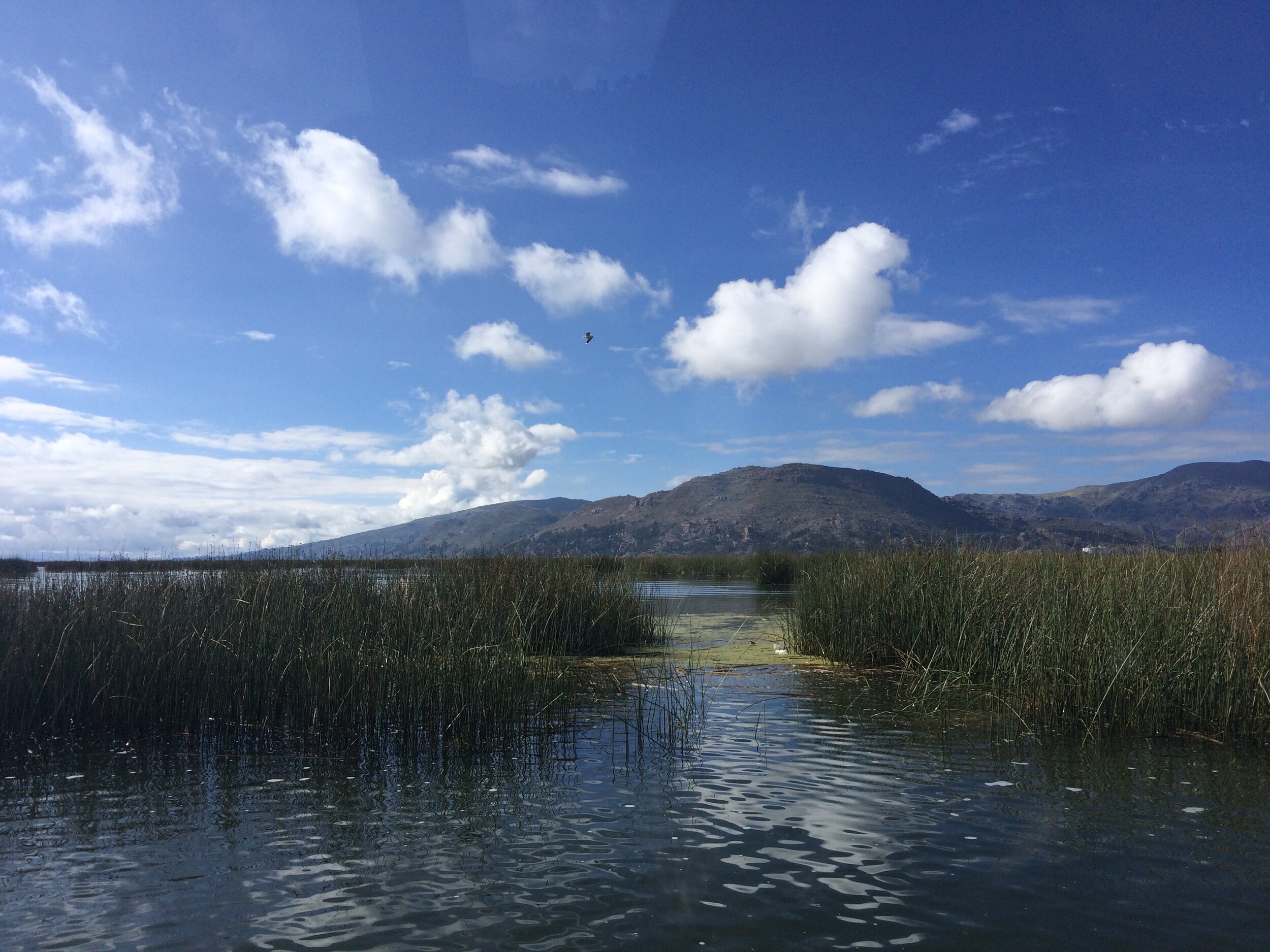
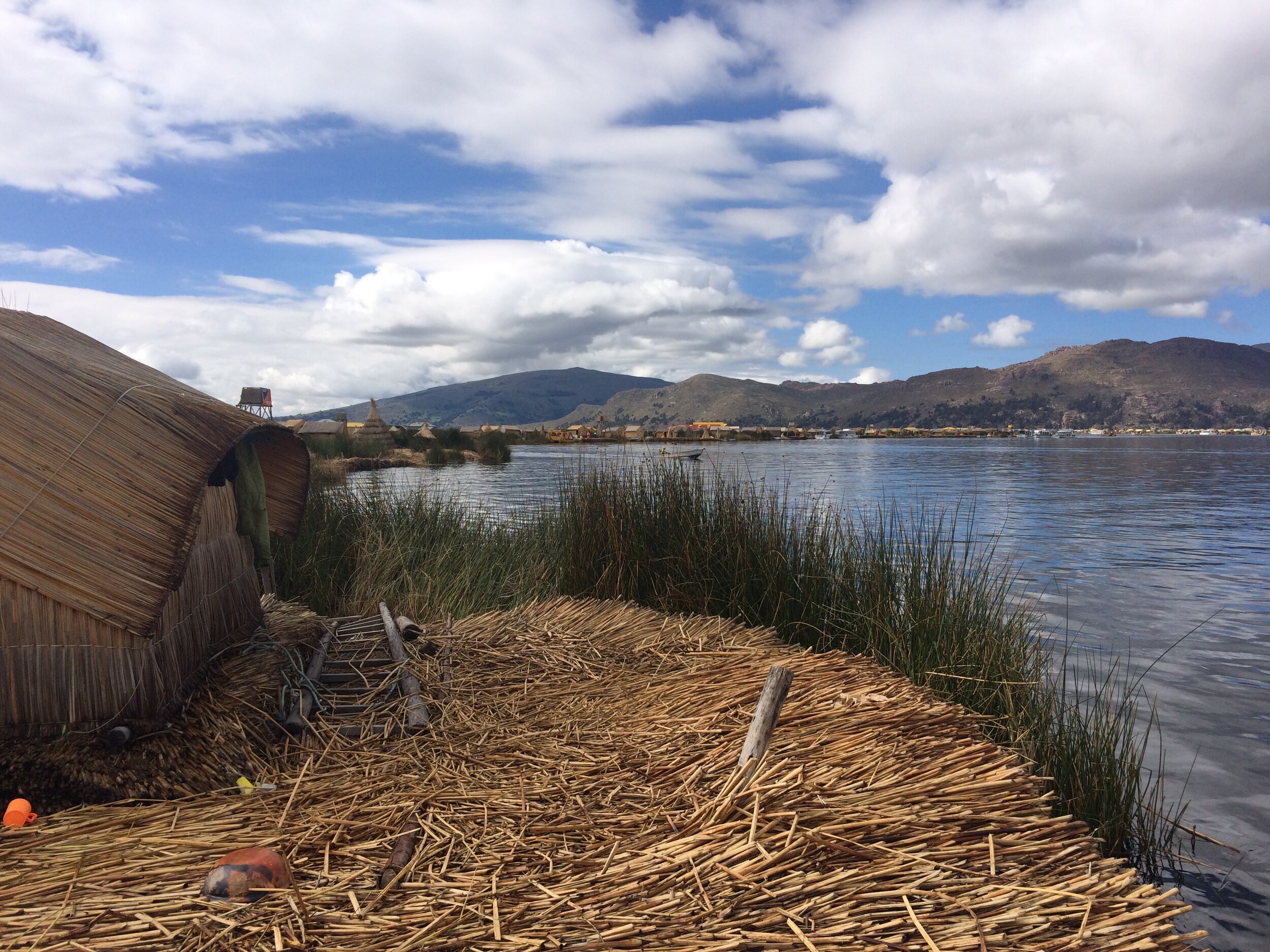

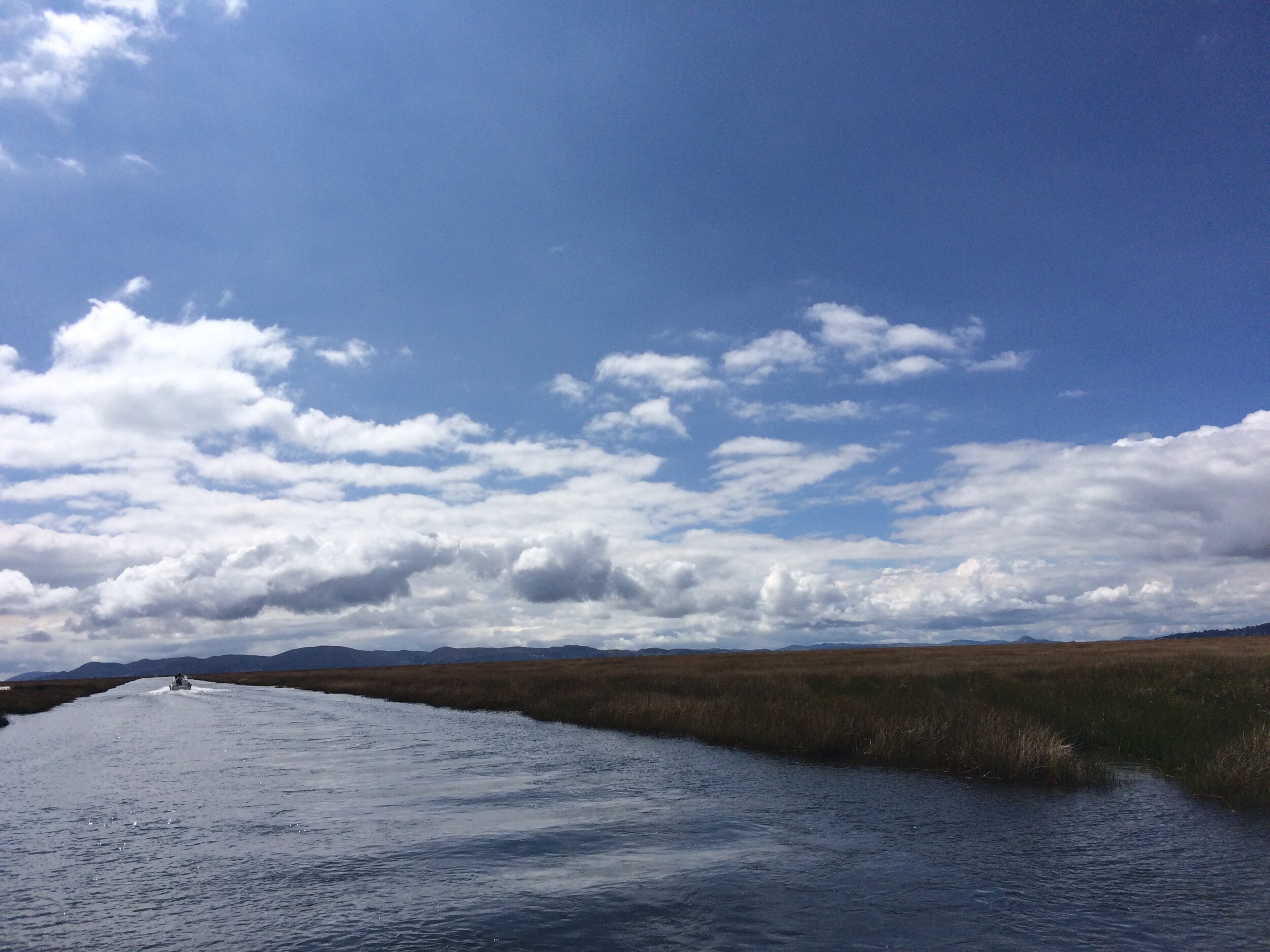 The tourist office we purchased our tickets through explained there would be a family to greet us at the dock who we could stay with. Arriving we saw nobody. We did see a sign with the town's rules, including a "do not feed candy to the children." We climbed ashore and began walking with the crew down a skinny path that twisted along the island's side. It was breathtaking. Vibrant green fields with colorful quinoa growing tall, children selling beautiful, bright colored string bracelets, and my favorite observance; the lack of noise. As our walk to the town's center continued, I noticed something odd. In passing or in the fields all I saw were women. Carrying loads of bricks, stalks, food, even children all wrapped up in thick colorful blankets on their backs. Finally I asked one of the guides. "¿Donde esta los hombres? Solo veo mujeres en las fincas" [Where are the men? I only see women on the farms]. "Los hombres knit y las mujeres trabajan afuera," dice mi guia (the men knit and the women work outside, said my guide). THE MEN KNIT AND THE WOMEN WORK IN THE FIELDS?? Where the hell are we, I thought to myself. The men sit inside in the shade knitting gorgeous hand-crafted sweaters, hats, vests, blankets, belts, and more while the women handle the farming and the heavy-lifting? Crazy. I relayed this to the boys. They immediately considered moving to the island.
The tourist office we purchased our tickets through explained there would be a family to greet us at the dock who we could stay with. Arriving we saw nobody. We did see a sign with the town's rules, including a "do not feed candy to the children." We climbed ashore and began walking with the crew down a skinny path that twisted along the island's side. It was breathtaking. Vibrant green fields with colorful quinoa growing tall, children selling beautiful, bright colored string bracelets, and my favorite observance; the lack of noise. As our walk to the town's center continued, I noticed something odd. In passing or in the fields all I saw were women. Carrying loads of bricks, stalks, food, even children all wrapped up in thick colorful blankets on their backs. Finally I asked one of the guides. "¿Donde esta los hombres? Solo veo mujeres en las fincas" [Where are the men? I only see women on the farms]. "Los hombres knit y las mujeres trabajan afuera," dice mi guia (the men knit and the women work outside, said my guide). THE MEN KNIT AND THE WOMEN WORK IN THE FIELDS?? Where the hell are we, I thought to myself. The men sit inside in the shade knitting gorgeous hand-crafted sweaters, hats, vests, blankets, belts, and more while the women handle the farming and the heavy-lifting? Crazy. I relayed this to the boys. They immediately considered moving to the island. 
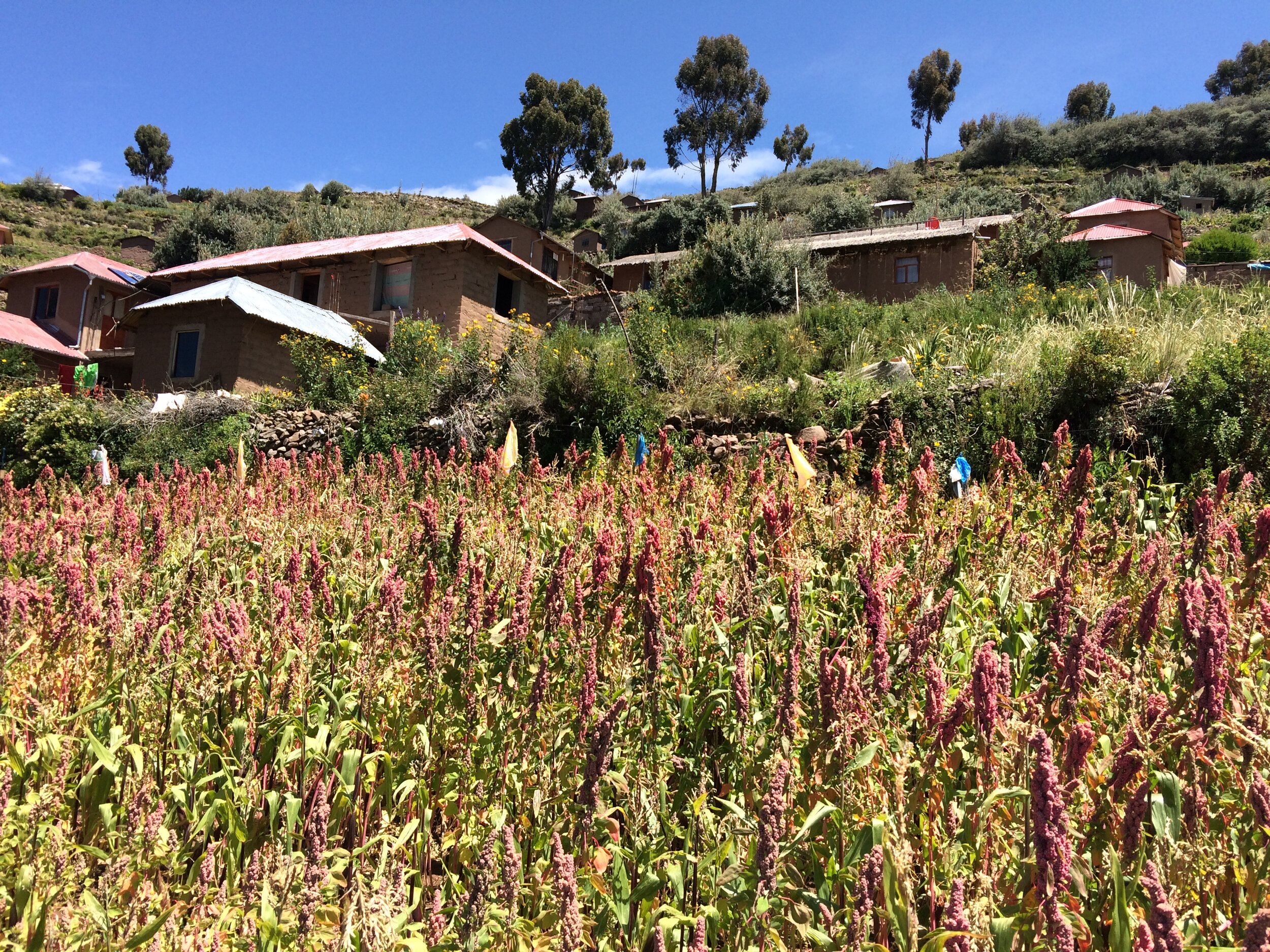 [quinoa fields]At the town's center the truth revealed itself. An entire building dedicated to the 'Knitting Men.' Famished by the long day of travel, we chose to head straight to a restaurant to feed our aching bellies. Our guides had explained the town takes turns. Families as well as restaurants rotate to give every merchant an equal chance to make money. The entire island works collectively and shares the money they earn. Our restaurante had a lovely view [see below] but when explaining Ryan and I's strict diet we learned fries and rice would be our only option. Luckily they served bread with salsa and a quinoa soup for starters. A meat-free island, with the exception of chicken when they bring it home from Puno, they rely on eggs and fish as their main source of protein. We knew we'd have to choose one or the other to survive the next few meals. After our carb-loaded lunch we set off with Julian, the father of our given family. The town square looked bare minus the few Westerners looking around with confusion. Julian showed us to his home, a lovely three building compound sat on a hillside farm with an outhouse nearby. The main building consisted of a sewing room, a dining room, and four bedrooms above. Across was the family's living quarters though they kept the door closed and the curtains shut. The other side of their home was a covered kitchen and wash up area. We chose our rooms and were happy to find out it only costed us 15 soles ($5), our cheapest bed yet in Peru. We expressed we'd like to join him for dinner, but first we wanted to check out the island.
[quinoa fields]At the town's center the truth revealed itself. An entire building dedicated to the 'Knitting Men.' Famished by the long day of travel, we chose to head straight to a restaurant to feed our aching bellies. Our guides had explained the town takes turns. Families as well as restaurants rotate to give every merchant an equal chance to make money. The entire island works collectively and shares the money they earn. Our restaurante had a lovely view [see below] but when explaining Ryan and I's strict diet we learned fries and rice would be our only option. Luckily they served bread with salsa and a quinoa soup for starters. A meat-free island, with the exception of chicken when they bring it home from Puno, they rely on eggs and fish as their main source of protein. We knew we'd have to choose one or the other to survive the next few meals. After our carb-loaded lunch we set off with Julian, the father of our given family. The town square looked bare minus the few Westerners looking around with confusion. Julian showed us to his home, a lovely three building compound sat on a hillside farm with an outhouse nearby. The main building consisted of a sewing room, a dining room, and four bedrooms above. Across was the family's living quarters though they kept the door closed and the curtains shut. The other side of their home was a covered kitchen and wash up area. We chose our rooms and were happy to find out it only costed us 15 soles ($5), our cheapest bed yet in Peru. We expressed we'd like to join him for dinner, but first we wanted to check out the island.  He led us to the highest point of the island where he described the Andean culture and the importance of making an offer to Pachamama. He then shared his coca leaves with us, and he explained that the Catholic cross that hung in the ruins is just as important. It's typical for Peruvians to express their love for their Andean and Catholicism views. Here both share the viewpoint and often use it for gatherings to celebrate custom rituals. Julian then described the history of the island and we sort of understood. Apparently when the Incas were conquered, a conquistador named Taquile came through the island hence the name. Then the government used it as a political prison, then a normal one. Older natives still lived on the land and slowly started buying pieces back and eventually took it over. Then slowly more settlers moved to Taquile from surrounding islands and joined the simple, quiet lifestyle. Their moral code to live by in Quechua (the native language) is "ama sua, ama llulla, ama qhilla," meaning "do not steal, do not lie, and do not be lazy." The people follow a community collectivism. All is fair, equal and everyone does their part. The men traditional wear black pants, a white pleated long sleeve shirt, a short vest, a wide belt woven in beautiful designs, a cap that resembles an old school night cap that is white if you are single and full of color once married, and the final touch, a small satchel that ties around the waist full of coca leaves [called a chuspa]. Women wear long, heavy skirts and bright tops always carrying a large shawl with goods or children on their back.
He led us to the highest point of the island where he described the Andean culture and the importance of making an offer to Pachamama. He then shared his coca leaves with us, and he explained that the Catholic cross that hung in the ruins is just as important. It's typical for Peruvians to express their love for their Andean and Catholicism views. Here both share the viewpoint and often use it for gatherings to celebrate custom rituals. Julian then described the history of the island and we sort of understood. Apparently when the Incas were conquered, a conquistador named Taquile came through the island hence the name. Then the government used it as a political prison, then a normal one. Older natives still lived on the land and slowly started buying pieces back and eventually took it over. Then slowly more settlers moved to Taquile from surrounding islands and joined the simple, quiet lifestyle. Their moral code to live by in Quechua (the native language) is "ama sua, ama llulla, ama qhilla," meaning "do not steal, do not lie, and do not be lazy." The people follow a community collectivism. All is fair, equal and everyone does their part. The men traditional wear black pants, a white pleated long sleeve shirt, a short vest, a wide belt woven in beautiful designs, a cap that resembles an old school night cap that is white if you are single and full of color once married, and the final touch, a small satchel that ties around the waist full of coca leaves [called a chuspa]. Women wear long, heavy skirts and bright tops always carrying a large shawl with goods or children on their back.

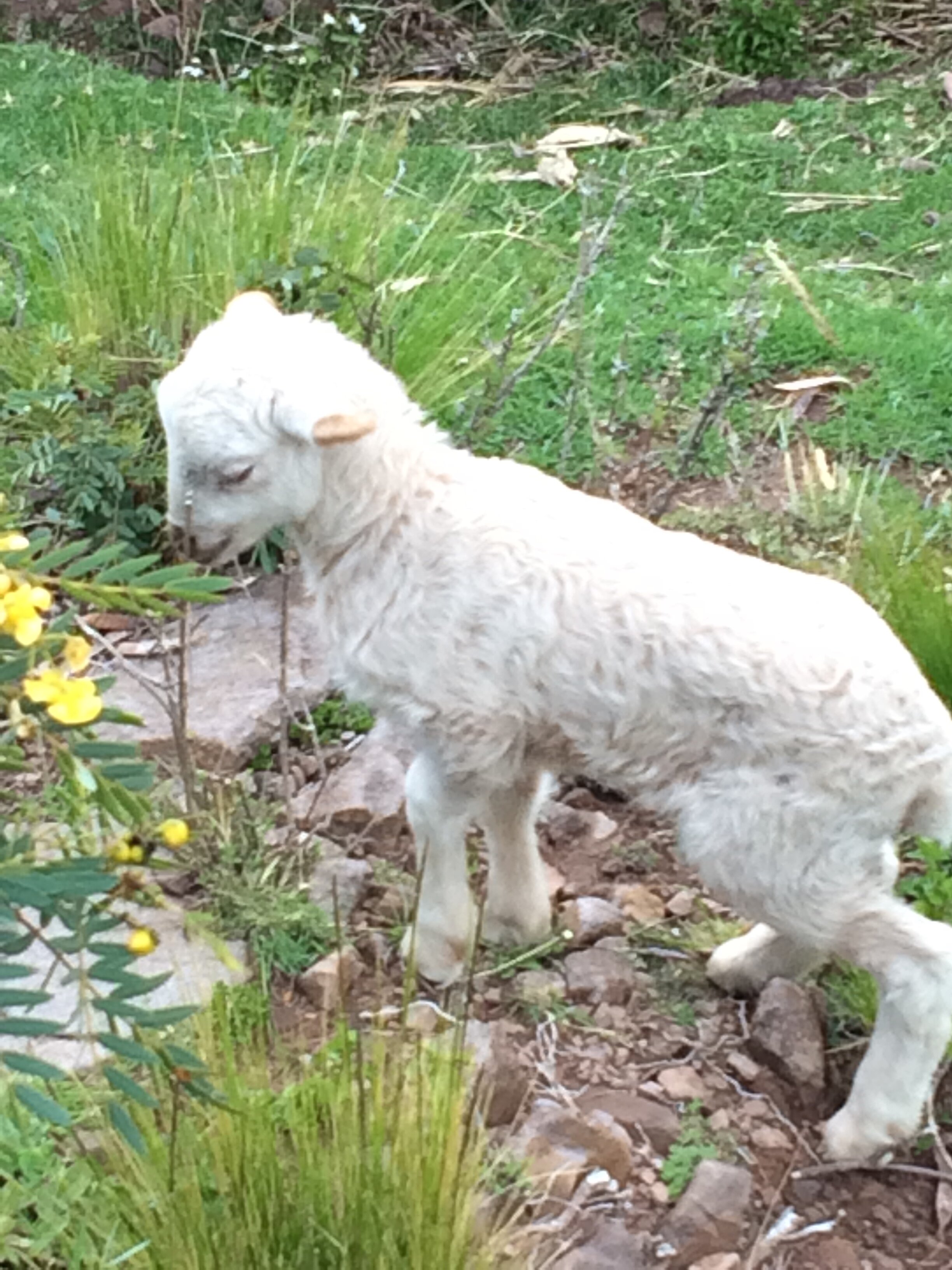
 After exploring the area we took off to venture through the rest of the island. Jaw dropping cliffs ran along the water's edge and the rocky path winded through homes and farms. The 7sq/km island is full of pre-Inca terracing and small ruins with the Bolivian snow-capped mountains making brilliant background. We returned to the home and decided to venture out for a snack [dinner wasn't for a few hours and these boys get hungry every hour]. Returning to the main square we felt like we were in a ghost town. Every store was boarded up, the knitting men museum closed, the restaurants taken down and locked up, and not a soul to be seen. No dogs, cats, nada. No car, motorbike horns, no dogs barking, no fireworks, not a sound. In two hours the town disappeared. Looking for the supposedly "market" we discovered one tiny bogeda selling a few snacks and drinks. We purchased our favorite Peruvian spicy fritos, a few pieces of bread and sodas and continued to ponder this odd town. With its' dramatic hanging cliffs, hilly terrains, and creepy quiet behavior we decided we landed ourselves on Shutter Island. While heading back to our homestay we noticed a change in the weather. The temperature dropped as well as the clouds and from a distance we could see lightning. We immediately took off in search of the highest point to observe the storm. To the front lightning struck in gorgeous bolts making the sky light up for a second. To the right the sun set on the island making the land glow. And to the left an perfectly colored rainbow stretched across the Bolivian border. We stood in awe for over a half hour pointing out the lightning and I couldn't help but think we were on some kind of Survivor/Lost episode. Better yet it was like the second Hunger Games: Catching Fire where the clock-like course spun with different types of disasters. Eventually the rain hit us and the sun disappeared and we climbed in to bed with empty bellies waiting for dinner.
After exploring the area we took off to venture through the rest of the island. Jaw dropping cliffs ran along the water's edge and the rocky path winded through homes and farms. The 7sq/km island is full of pre-Inca terracing and small ruins with the Bolivian snow-capped mountains making brilliant background. We returned to the home and decided to venture out for a snack [dinner wasn't for a few hours and these boys get hungry every hour]. Returning to the main square we felt like we were in a ghost town. Every store was boarded up, the knitting men museum closed, the restaurants taken down and locked up, and not a soul to be seen. No dogs, cats, nada. No car, motorbike horns, no dogs barking, no fireworks, not a sound. In two hours the town disappeared. Looking for the supposedly "market" we discovered one tiny bogeda selling a few snacks and drinks. We purchased our favorite Peruvian spicy fritos, a few pieces of bread and sodas and continued to ponder this odd town. With its' dramatic hanging cliffs, hilly terrains, and creepy quiet behavior we decided we landed ourselves on Shutter Island. While heading back to our homestay we noticed a change in the weather. The temperature dropped as well as the clouds and from a distance we could see lightning. We immediately took off in search of the highest point to observe the storm. To the front lightning struck in gorgeous bolts making the sky light up for a second. To the right the sun set on the island making the land glow. And to the left an perfectly colored rainbow stretched across the Bolivian border. We stood in awe for over a half hour pointing out the lightning and I couldn't help but think we were on some kind of Survivor/Lost episode. Better yet it was like the second Hunger Games: Catching Fire where the clock-like course spun with different types of disasters. Eventually the rain hit us and the sun disappeared and we climbed in to bed with empty bellies waiting for dinner.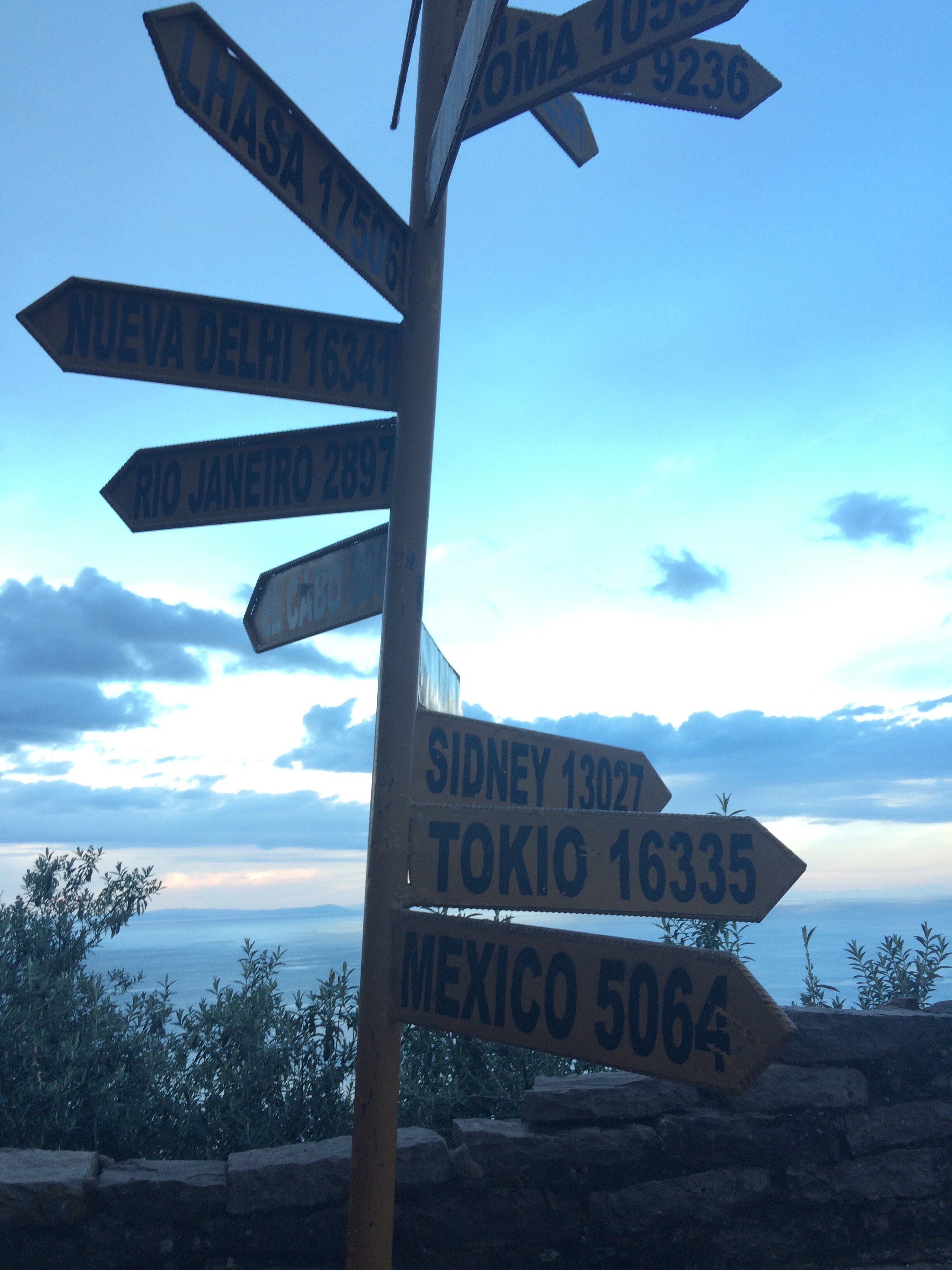 [ sign in the desolate town square, how many misspellings can you find?]
[ sign in the desolate town square, how many misspellings can you find?]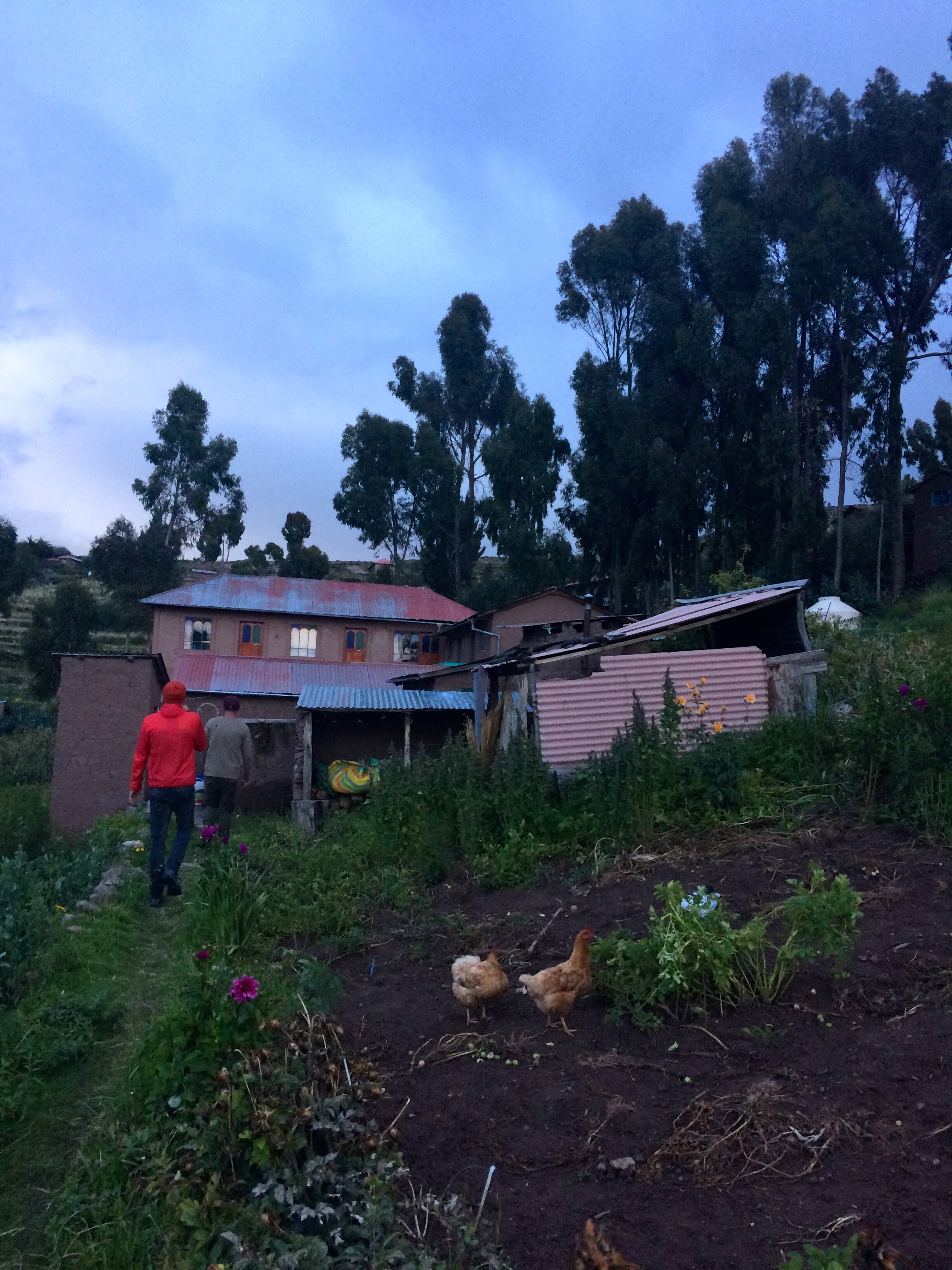 [our home for the night]Dinner by candlelit was lovely. We learned that the town's only electricity comes from solar panels installed by the Japanese decades before. Although we never saw a hint of electricity working, we found it more fitting with the island's culture. Julian joined us for dinner while his young son, Alexander ran around making faces at us. His son entertained us by hiding in corners and popping out in different places to see if we could catch him. For dinner we were served the most delicious potato soup we've experienced in all of Peru. The perfect mix of home-grown veggies and simple spices. Earlier I had let Julian know we do not consume fish [without thinking the other option is usually an omelet]. For our main an omelet the size of the plate arrived with a bed of rice and fries hidden underneath. As much as I wished I could eat the eggs to not offend our host, I couldn't stomach the smell and taste. While Julian left the dining room, I shoveled my portion to the boys and finished another meal of rice and fries. We were in bed before 9pm, curled up with heaps of blankets listening to the storm surround the island. At some point in the middle of the night I headed for the outhouse. I wish I wore my glasses because when I looked up the sky, even through my blurriness, the stars lit up the night. With no light nor air pollution,
[our home for the night]Dinner by candlelit was lovely. We learned that the town's only electricity comes from solar panels installed by the Japanese decades before. Although we never saw a hint of electricity working, we found it more fitting with the island's culture. Julian joined us for dinner while his young son, Alexander ran around making faces at us. His son entertained us by hiding in corners and popping out in different places to see if we could catch him. For dinner we were served the most delicious potato soup we've experienced in all of Peru. The perfect mix of home-grown veggies and simple spices. Earlier I had let Julian know we do not consume fish [without thinking the other option is usually an omelet]. For our main an omelet the size of the plate arrived with a bed of rice and fries hidden underneath. As much as I wished I could eat the eggs to not offend our host, I couldn't stomach the smell and taste. While Julian left the dining room, I shoveled my portion to the boys and finished another meal of rice and fries. We were in bed before 9pm, curled up with heaps of blankets listening to the storm surround the island. At some point in the middle of the night I headed for the outhouse. I wish I wore my glasses because when I looked up the sky, even through my blurriness, the stars lit up the night. With no light nor air pollution, Shutter Taquile island became a stargazer's dream.The next morning I rose believing the entire town must be early risers. Not a soul could be seen moving when we went to bed, but my predictions were wrong and I sat in bed reading and waiting for the island to wake up. It wasn't until close to 9am I saw the first movement, which was also time for breakfast. We sat down with more endless tea and a delicious large pancake [again not vegan, but better than eggs]. Alexander continued to run around and when I asked about school, I was informed that the teachers were in Puno for yearly conferences. Lucky kid. We heard about a beach on the far side of the island and decided to go explore. After a sweaty hour winding up and down the island we arrived at a gorgeous, empty beach [see below]. At such a high altitude the lake felt as cold as ice, but after our hot walk we happily dove in.

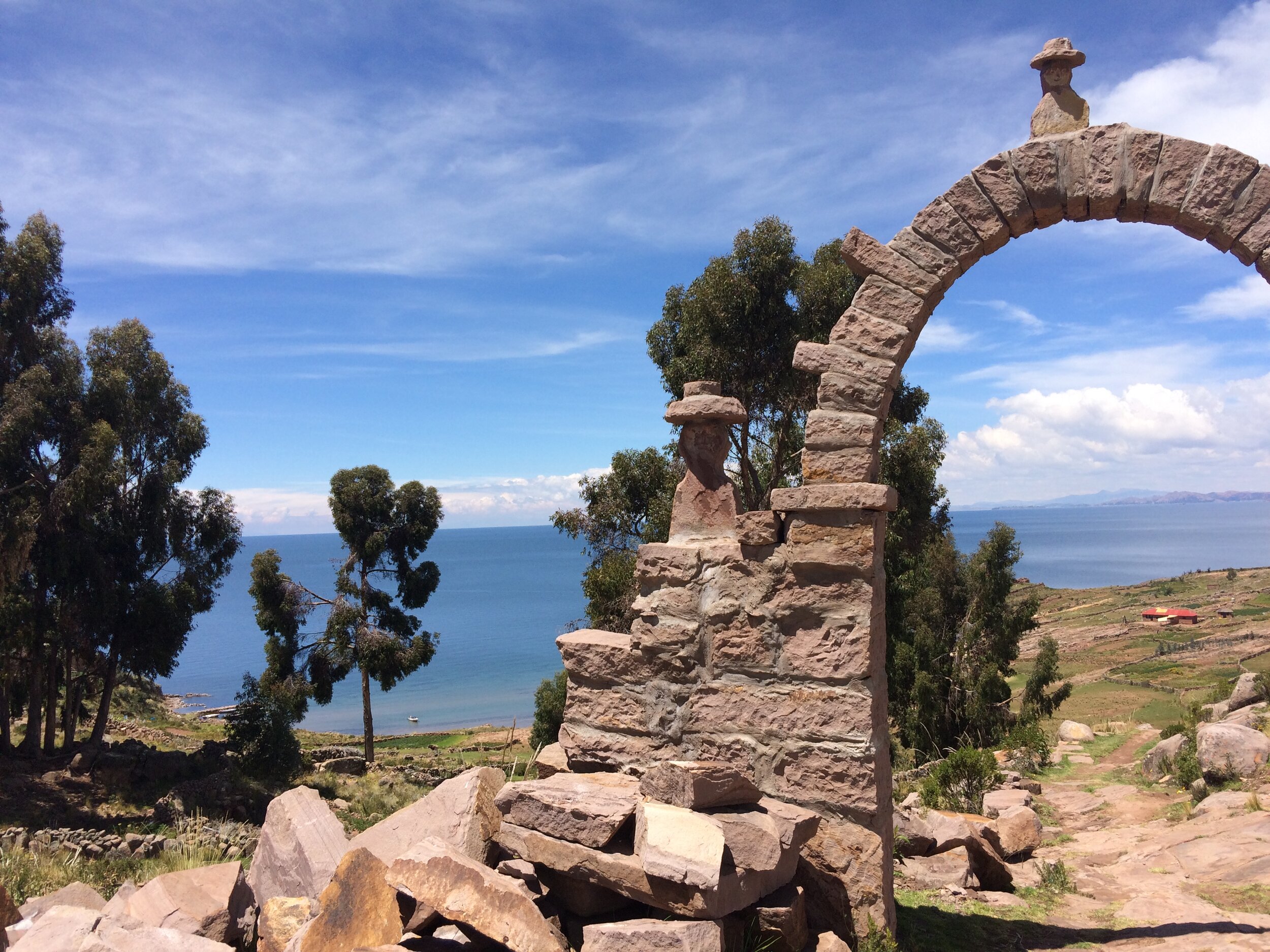 After 45 short minutes we headed back to our homestay to indulge in lunch. I made sure to order fish this time around knowing I could stomach fresh trout. When my plate arrived I quickly passed it to Ryan, making Freddy not look like a fish anymore. I could not handle the scales or any sign that it was living at one point. With a bit of lime juice and salt, the fish went down easily and I was glad to finally get some protein in my body.RIP freddy, I promise I won't eat you or your friends anymore.
After 45 short minutes we headed back to our homestay to indulge in lunch. I made sure to order fish this time around knowing I could stomach fresh trout. When my plate arrived I quickly passed it to Ryan, making Freddy not look like a fish anymore. I could not handle the scales or any sign that it was living at one point. With a bit of lime juice and salt, the fish went down easily and I was glad to finally get some protein in my body.RIP freddy, I promise I won't eat you or your friends anymore.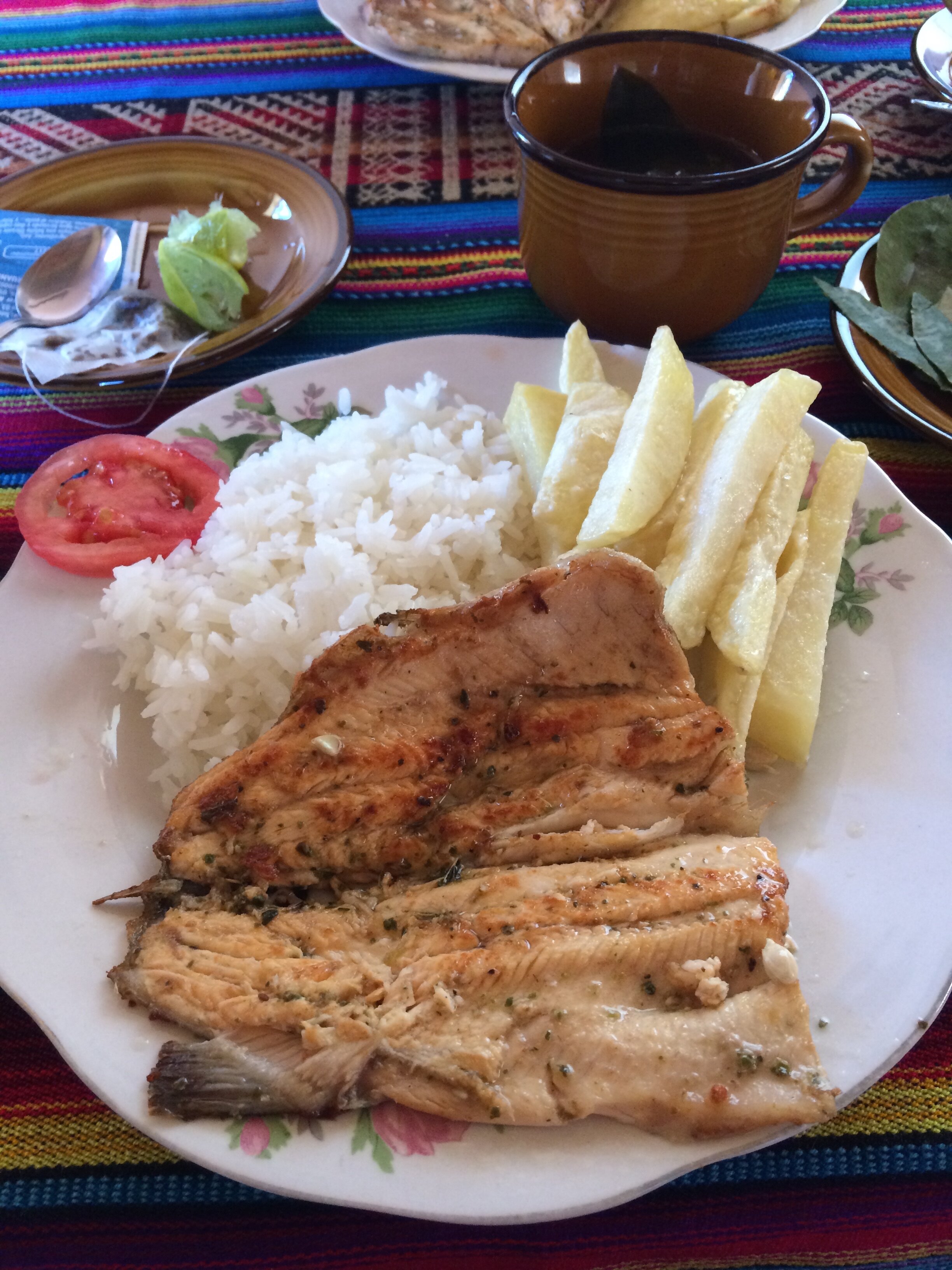 After lunch we only had a little bit of time before embarking on our journey back to Puno and decided to check out the knitting men shops. No actual men knitting, but many women selling the beautiful woven souvenirs and I ended up with a hand full of bracelets and this sun hat [below].
After lunch we only had a little bit of time before embarking on our journey back to Puno and decided to check out the knitting men shops. No actual men knitting, but many women selling the beautiful woven souvenirs and I ended up with a hand full of bracelets and this sun hat [below].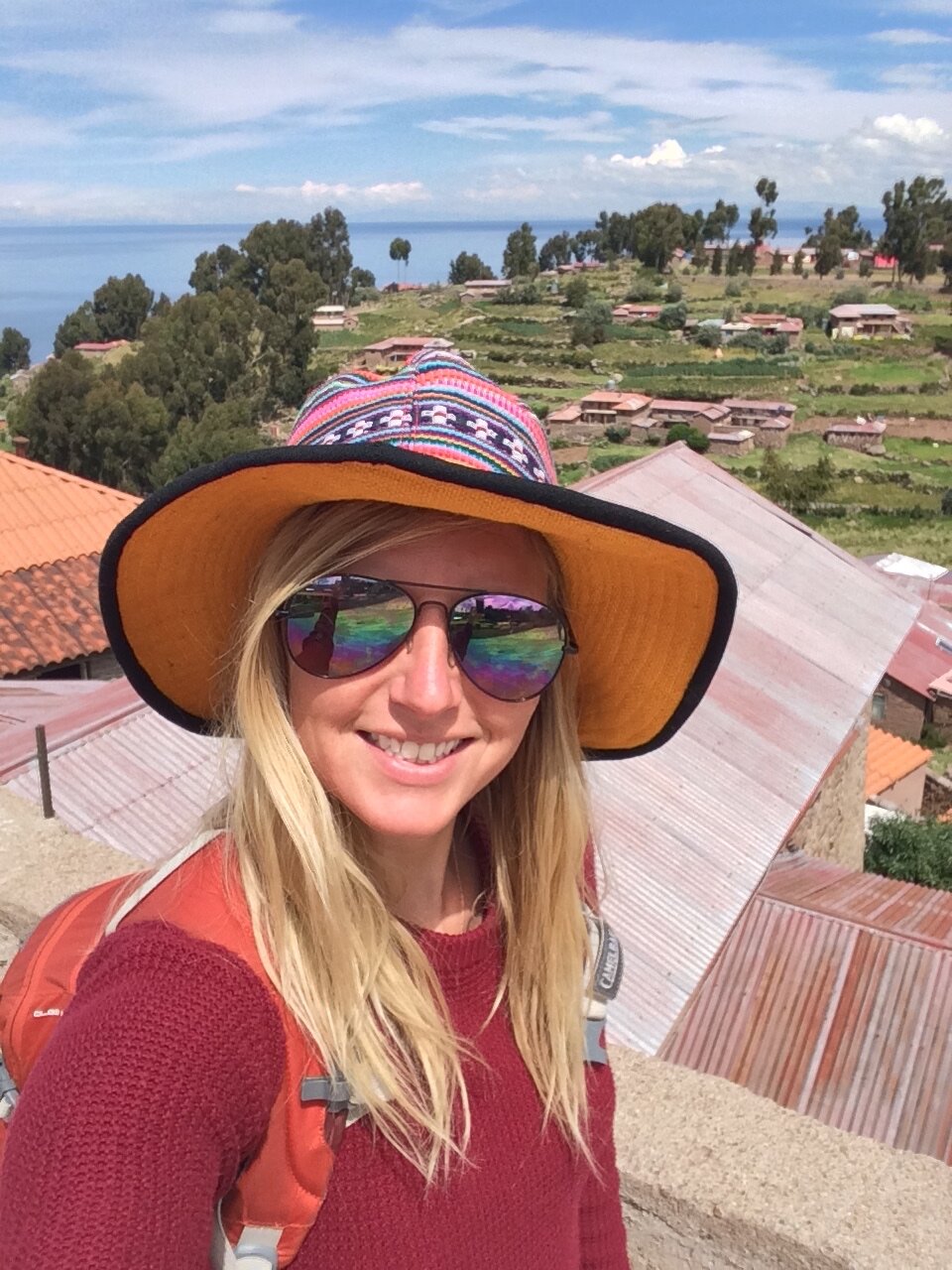 Leaving the island at a different port included 500+ steep stairs down to the water's edge. From there we climbed aboard our vessel crossing our fingers it would be faster than the prior. The boat filled up fast, mostly with locals and a small group of Germans, and we sunk lower in the water. Once it finally left the dock we laughed. It was much slower than the first journey and we were in for a long ride home. We attempted to sleep, but for most of the trip we got an hear-full of loud, German conversation. Then this little guy [pic below] decided to wander around aimlessly climbing on to strangers in search of any candy, snacks, or soda. He played on my phone for a while and when I showed him the camera feature he took an array of selfies. He also did not want to return it and went digging for all my snacks and candy.
Leaving the island at a different port included 500+ steep stairs down to the water's edge. From there we climbed aboard our vessel crossing our fingers it would be faster than the prior. The boat filled up fast, mostly with locals and a small group of Germans, and we sunk lower in the water. Once it finally left the dock we laughed. It was much slower than the first journey and we were in for a long ride home. We attempted to sleep, but for most of the trip we got an hear-full of loud, German conversation. Then this little guy [pic below] decided to wander around aimlessly climbing on to strangers in search of any candy, snacks, or soda. He played on my phone for a while and when I showed him the camera feature he took an array of selfies. He also did not want to return it and went digging for all my snacks and candy.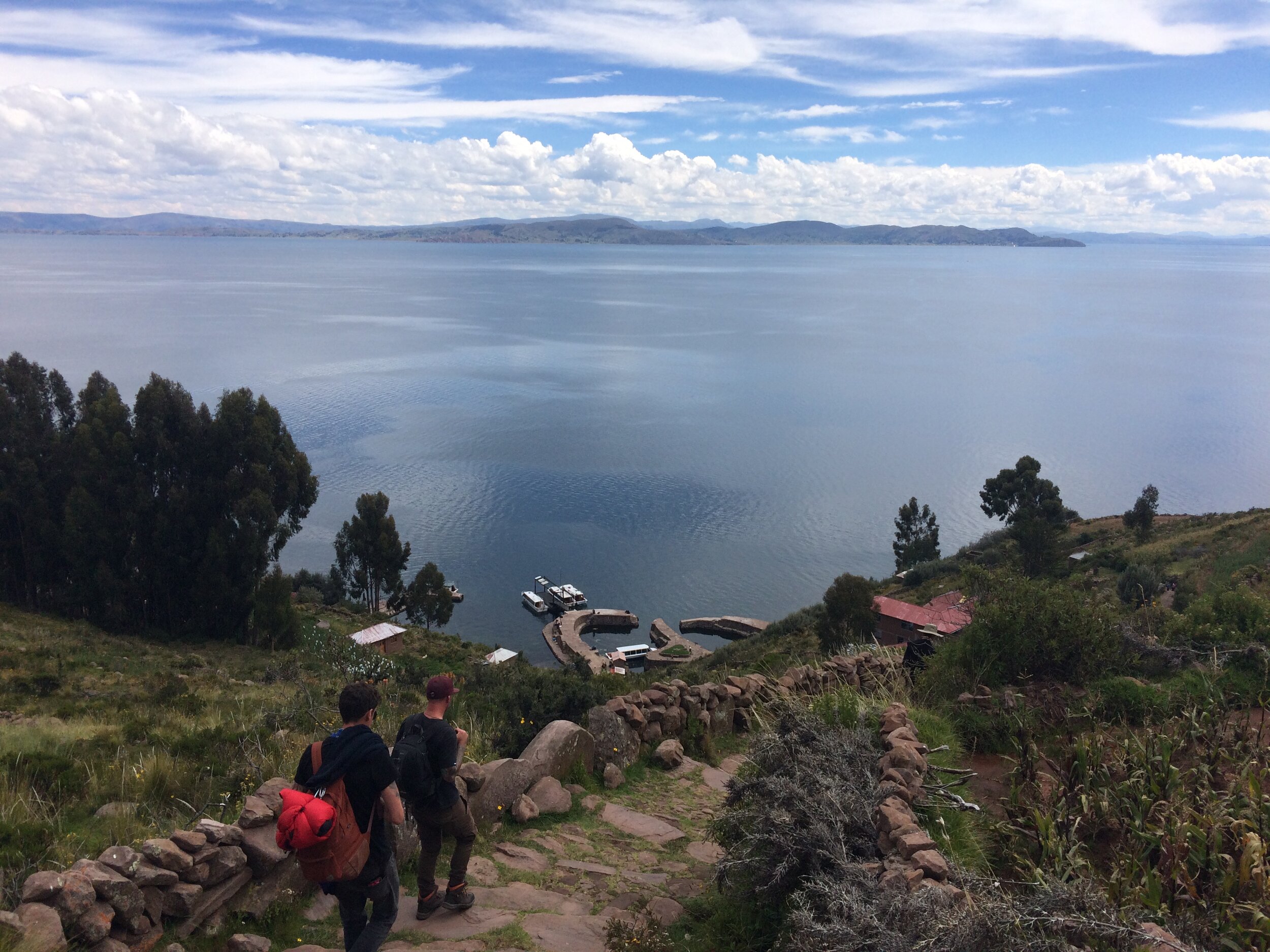
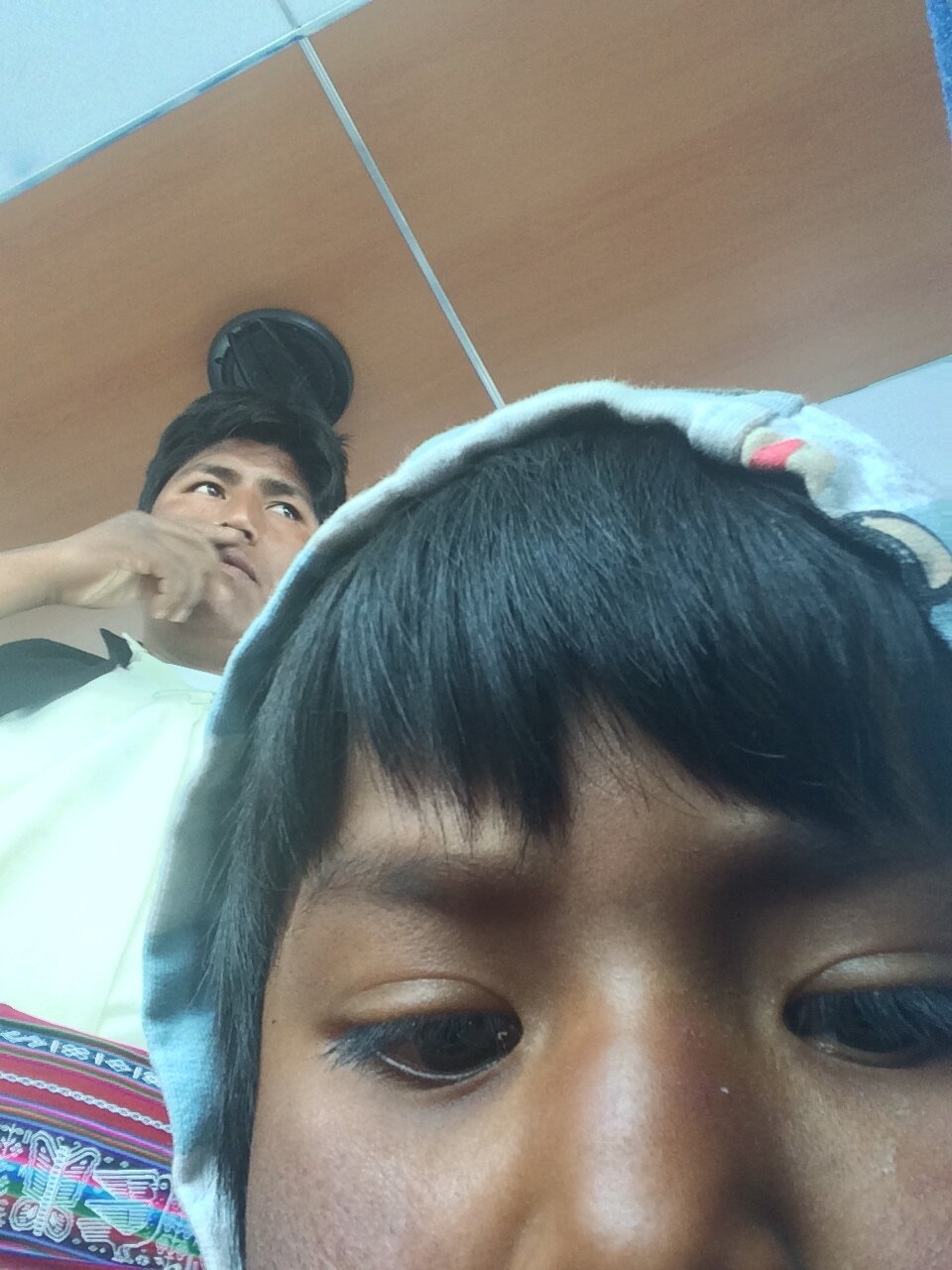 Puno finally appeared in the distance and before sunset we disembarked. After a strange two days of eery silence and unfamiliar behaviors, I was thankful for the experience, yet happy to head off to the next Peruvian city. Huq p'unchaykama [Quechua for 'until another day']Viktoria Next up stories on the disasters we just can't avoid.
Puno finally appeared in the distance and before sunset we disembarked. After a strange two days of eery silence and unfamiliar behaviors, I was thankful for the experience, yet happy to head off to the next Peruvian city. Huq p'unchaykama [Quechua for 'until another day']Viktoria Next up stories on the disasters we just can't avoid.

